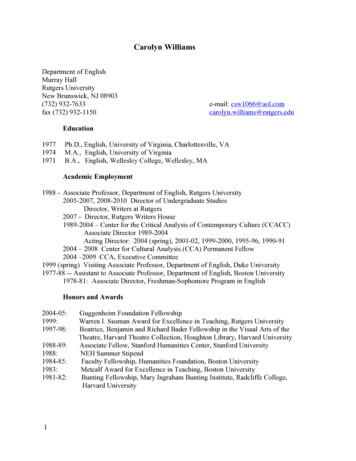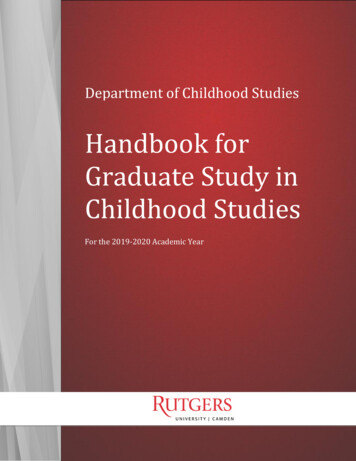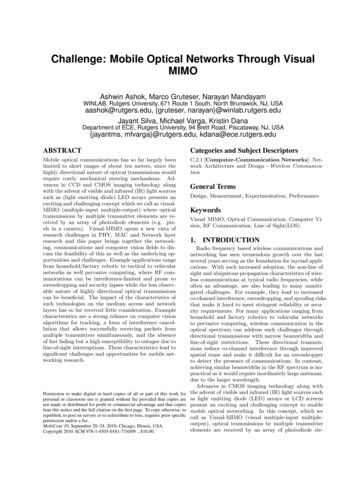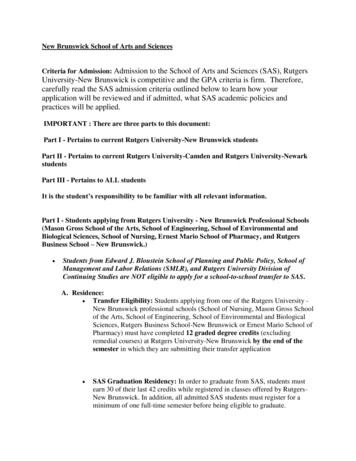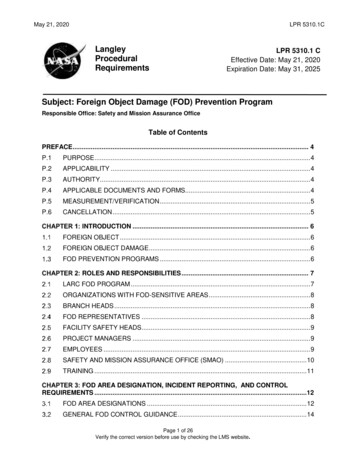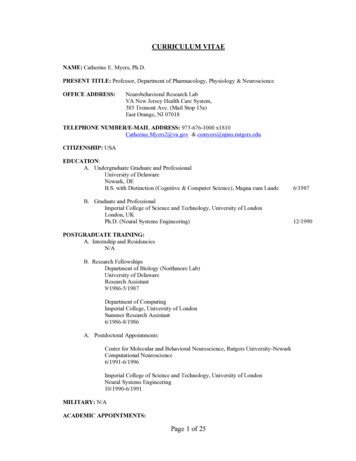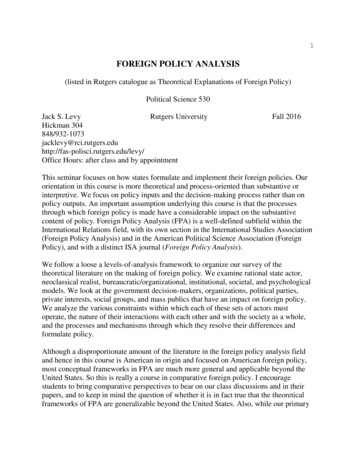
Transcription
1FOREIGN POLICY ANALYSIS(listed in Rutgers catalogue as Theoretical Explanations of Foreign Policy)Political Science 530Jack S. LevyRutgers UniversityHickman polisci.rutgers.edu/levy/Office Hours: after class and by appointmentFall 2016This seminar focuses on how states formulate and implement their foreign policies. Ourorientation in this course is more theoretical and process-oriented than substantive orinterpretive. We focus on policy inputs and the decision-making process rather than onpolicy outputs. An important assumption underlying this course is that the processesthrough which foreign policy is made have a considerable impact on the substantivecontent of policy. Foreign Policy Analysis (FPA) is a well-defined subfield within theInternational Relations field, with its own section in the International Studies Association(Foreign Policy Analysis) and in the American Political Science Association (ForeignPolicy), and with a distinct ISA journal (Foreign Policy Analysis).We follow a loose a levels-of-analysis framework to organize our survey of thetheoretical literature on the making of foreign policy. We examine rational state actor,neoclassical realist, bureaucratic/organizational, institutional, societal, and psychologicalmodels. We look at the government decision-makers, organizations, political parties,private interests, social groups, and mass publics that have an impact on foreign policy.We analyze the various constraints within which each of these sets of actors mustoperate, the nature of their interactions with each other and with the society as a whole,and the processes and mechanisms through which they resolve their differences andformulate policy.Although a disproportionate amount of the literature in the foreign policy analysis fieldand hence in this course is American in origin and focused on American foreign policy,most conceptual frameworks in FPA are much more general and applicable beyond theUnited States. So this is really a course in comparative foreign policy. I encouragestudents to bring comparative perspectives to bear on our class discussions and in theirpapers, and to keep in mind the question of whether it is in fact true that the theoreticalframeworks of FPA are generalizable beyond the United States. Also, while our primary
2focus is on the behavior of states, we include some literature on how inter- or supranational organizations and non-state actors formulate their external policies.Any course must emphasize some things and deemphasize others. In this seminar, wefocus primarily on internal rather than external causal influences on foreign policy, inpart because this is the norm of the foreign policy analysis field, and in part becauseexternal variables are covered at length in other international relations courses. Second,again reflecting the FPA field, we give only minimal attention to particular Americaninstitutions such as the Departments of State or Defense, the National Security Council,or the Congress. Third, we give significant emphasis to decision-making by top politicalleaders. Fourth, there are more applications to the literature on security than politicaleconomy, environmental policy, human rights, or other areas. This reflects the state of theliterature on foreign policy analysis and the general neglect of decision-making variablesin the subfield of International Political Economy and other sub-fields. It also reflects myown intellectual interests. However, I encourage students with an interest in internationalpolitical economy, environmental policy, or other areas to think about how to applydecision-making models to their areas of interest. Finally, this syllabus gives moreattention to psychological models than does the typical syllabus on foreign policyanalysis. I leave it to you to decide whether that emphasis is warranted.ReadingsThe following required books (all paperback) are available for purchase at the RutgersUniversity Bookstore (Gateway Transit Building, 100 Somerset Street, New Brunswick,732 246 8448 tel).You might also check the used book market on the internet. I have alsoasked Alexander Library to place a copy of each of these books on graduate reserve. Inthe order that we will read them, they areMorton H. Halperin, Priscilla Clapp, with Arnold Kanter, Bureaucratic Politicsand Foreign Policy. 2nd ed. Washington, D.C.: Brookings, 2006.Daniel Kahneman, Thinking, Fast and Slow. New York: Farrar, Straus and Giroux,2011.Rose McDermott, Political Psychology in International Relations. Ann Arbor:University of Michigan Press, 2004.We will also be reading a substantial number of articles and book chapters, because muchof the important theoretical and empirical work in foreign policy analysis has beenpublished in this form. All of the required reading except for the three required books will
3be available at my Sakai site (https://sakai.rutgers.edu/). Log in to Sakai, look for theForeign Policy Analysis tab, and click resources, which are organized by week of theterm. I recommend that each week you do the readings in the order listed on the syllabus,not the alphabetical order of Sakai.Course Requirements:There are four basic requirements for the course:1) participation in class discussions of the readings and of student presentations;2) lead discussion on a particular topic, selected from the list provided below.3) oral presentation (based on #4)4) final paper (literature review, research design, or research paper)Our weekly meetings will begin with my own introductory comments on the topics underconsideration, sometimes with a quick transition to student presentations related torequirements #2 or 3 above. Research designs and research papers will be presented laterin the term. Most weeks we will cover several distinct topics, and we may have more thanone presentation. For this system to work, and for students to benefit from it, each memberof the seminar must complete all of the required reading prior to each class meeting and beprepared to discuss it. Each week I will try to provide some guidance as to what toemphasize in the following week’s reading.Regarding requirement #2 above, each student will select one topic from the following listand give a 6-10 minute in-class presentation (but not write a paper) on the requiredreadings related to that topic during the designated week.TopicweekRational/analytic model of decision-making 2eNeoclassical realism2iBureaucratic politics – critiques3gDecision unit approach4aAudience costs5iCoalitional models7cConstructivist approaches to FPA8fEmotions and s and biases11aFocus: dual process model anchoring, availability, representativenessProspect theory11c
4You should consult with me about exactly which readings are relevant for a particulartopic, but they are usually readily identifiable from the reading list below. For thispresentation you need only cover the required readings. It is not necessary to summarizethe readings in any detail, as we can assume that everyone has done the required readingfor the week. Rather, the emphasis should be on briefly situating the reading(s) in theliterature, identifying their primary contributions to the literature, noting any theoretical ormethodological weaknesses, and highlighting additional analytic questions raised by thereading. The 6-10 minute time allotment is short, so time management is important. Youwill have more time to elaborate in the follow-up discussion in class. There is no paperrequirement associated with this presentation. Your topic for requirement #2 should bedifferent from your topic for #3&4. I do not want duplication of topics among differentstudents for #2. (That is not a problem for #3&4).Requirements 3 & 4: Given the different backgrounds and goals of different members ofthe seminar, I have set up two alternative “tracks” or paper requirements, a literaturereview track and a research design/paper track. You are free to select whichever track youprefer. However, I generally recommend the research design or research paperrequirement to IR majors planning to write a dissertation that includes a component onhow states formulate and implement their foreign policies (on security, economic, humanrights, environmental policy, and other issues). It is perfectly reasonable, however, forfirst-year IR students who have limited exposure to a particular topic to do a literaturereview for this class, to pave the way for a more focused research effort in subsequentcourses. I recommend that IR minors, whose dissertation work is not likely to focus onhow states formulate foreign policy, adopt the literature review track. A good strategythere is to either pick a broad topic that is likely to serve you well in preparation forcomprehensive exams, or to pick a topic overlapping with the research you plan to do inyour major field. Please feel free to consult with me about which track best serves yourinterests. Regardless of which track you choose, I expect all students to do all the requiredreadings, to come prepared to discuss those readings in class, and to participate in thediscussions.1) literature review track (due Sunday December 18, by email attachment)The basic requirement is a literature review, along with a presentation in class on thesubject of the paper and on the day that subject is scheduled, as specified in the syllabus.The literature review should be approximately 12-15 pages (single space, with a spacebetween paragraphs, including footnotes and references). It should be a critical review ofthe literature on a well-defined theoretical question relating to foreign policy analysis,often but not always equivalent to a sub-section of the syllabus. For example, good topicsinclude the bureaucratic politics model, audience costs, Congress and foreign policy,
5foreign policy in parliamentary systems, ethnic groups or economic interest groups andforeign policy, culture and foreign policy, learning, prospect theory, emotions anddecision-making, and intelligence failure, to name a few. Decision-making by sub-stateorganizations and inter-governmental or supra-national organizations (the EuropeanUnion, for example) is also a viable topic as long as it has to do with world politics andnot primarily domestic politics. Whatever topic you choose, you must secure my approvalin advance – to avoid misunderstandings and to facilitate the scheduling of presentations. Iwould be happy to talk to you about what kinds of topics make the most sense given yourbackground and objectives in your graduate program and beyond.The readings (required and otherwise) from the relevant section of the syllabus generallyserve as a useful guide to what literature you should cover in your review, but pleaseconsult with me for suggestions as to possible additions (if the list on the syllabus is short)and/or priorities among them (if the list is quite long). Please do not assume that byreading all of the items in a particular section of the syllabus you have adequately covereda particular topic for your review. I also encourage you to incorporate material from othercourses where relevant.In your literature review you should summarize the literature on your topic and at thesame time organize it in some coherent way – preferably around a useful typology ortheoretical theme or set of categories, not around a succession of books and articles. Thatis, I do not want twenty paragraphs on twenty different authors or books/articles. Youshould note the theoretical questions that this literature attempts to answer, identifycommonalities and differences among the various readings, identify the key concepts andcausal arguments, survey some of the empirical research that bears on these theoreticalpropositions, and relate it to the broader literature on war and peace. You should identifythe logical inconsistencies, broader analytical limitations, and unanswered questions of theleading scholarship in this area. You should also suggest fruitful areas for subsequentresearch. If you have any thoughts on how particular hypotheses could be tested, pleaseelaborate on that. But remember that space is limited.I suspect that many of you will be uncertain what my expectations are for a literaturereview. To partially alleviate that uncertainty I will post a few literature reviews from pastcourses on my Sakai site (in folder #00).The presentation based on each literature review will be scheduled for the day we discussthat topic in class. This is important, and it requires you to plan in advance. This meansthat if you want to do a literature review on a topic that arises early in the term, you mustget to work early, in some cases before the semester begins.
6The formal part of the talk will be 12-15 minutes. You will then have the opportunity torespond to questions from the class for another half hour or so. I expect you to benefitfrom the feedback from class discussion and incorporate it into your paper, which is dueby email attachment Sunday, December 18 (anytime). Late papers run the risk oftriggering a grade of incomplete, given deadlines for handing in grades. Literature reviewpapers more than a few days late also trigger higher expectations as to quality.2) Research paper track (due December 18, by email attachment)The requirement here is variable, depending on the stage of a student's work on a project.If you are just starting on a research project, a research design will be sufficient. If youhave been working on a particular project for a while, I expect you to implement theresearch design and carry out the empirical research. If your paper for the class is aresearch design, I expect you to identify the question you are trying to answer, ground it inthe theoretical literature and in competing analytical approaches, specify your keyhypotheses, offer a theoretical explanation for those hypotheses, and provide a detailedstatement as to how you would carry out the research. This includes the specification ofthe dependent and independent variables and the form of the relationship between them,the operationalization of the variables, the identification (and theoretical justification) ofthe empirical domain of the study (i.e., case selection), the identification of alternativeexplanations for the phenomenon in question, and an acknowledgment of what kinds ofevidence would confirm your hypotheses and what kinds of evidence would disconfirm orfalsify your hypotheses. Try to do this in 12-15 pages (single space). Please consult withme along the way. In most cases I will ask for a one-page statement of your researchquestion and then a short outline, just to make sure we are on the same wavelength.I have high standards for the research designs. I think of them as roughly equivalent torough drafts of dissertation proposals or grant proposals. As to your class presentationbased on the research, consult with me, but in most cases I prefer that you spend relativelylittle time on a literature review, especially if we have already discussed the theoreticalbackground material, and to focus instead on your particular theoretical argument, specifichypotheses, and design and method for testing them. If you are envisioning case studies,provide a theoretical justification for your case selection.Research papers are more elaborate, and involve the completion of the empirical researchdetailed in the design of the project. There is no set length for a research paper, but oneguideline is about 20-30 pages (single space, space between paragraphs and betweenbibliographic items). Thirty pages is a bit over 12,000 words, which is toward the outer
7limit for most journal submissions. We will schedule research design/paper presentationsfor late in the term. However, if your topic fits earlier and if (and only if) you are ready atthat time we could go earlier (which would be a good way for you to get timely feedbackon your project). Although I tolerate incompletes for research papers, I still expect apresentation of the theory and research design during the term.I should note that although I am generally quite open to very different methodologicalperspectives, the norms of mainstream IR favor research that aims to construct and testfalsifiable (loosely defined) hypotheses about foreign policy or international behavior, orto construct interpretations of particular episodes and then support those interpretationswith empirical evidence. I share these norms, and I am unenthusiastic about theoreticalarguments about the empirical world for which there is no conceivable evidence thatwould lead to their rejection. At the same time, I recognize the value some researchcommunities place on formal theory construction independent of empirical test, or onradical constructivist critiques without systematic empirical analysis, and I would bewilling to discuss the possibility of papers along these lines.On reference style for papers for either track: You may use either a variation of the“Harvard” style or APA (American Psychological Association), with parenthetical in-textcitations, or a more traditional bibliographic style – as reflected in the Chicago Manual ofStyle or MLA (Modern Language Association). The main point is to be consistent. Seevarious journals for illustrations. I want a separate bibliography even if you use atraditional footnoting style. I strongly prefer footnotes to endnotes. They make a papereasier to read.Paper Due Date (for either track): December 18GradingThe bulk of your grade consists of my evaluation of your paper and two presentations,weighted as follows:Shorter presentation (requirement #2):10%Literature review or research paper presentation (#3): 20%Paper:70%In addition, the quality and quantity of your contribution to class discussion will be animportant factor in my evaluation of your performance in the course. Although I do notattach an explicit weight to this component of your grade, my judgments on thisdimension may be decisive in any borderline case. I suspect that many of you will fall intothis category.
8TOPICAL OUTLINEThe number refers to the week of the term, beginning with the week of 5 September 2016.Letters refer to multiple topics each week. Depending on student selections of paper topics,we might need to move a few things around.1.COURSE INTRODUCTIONTHEORETICAL INTRODUCTIONOverviews of the Foreign Policy Analysis FieldLevels of Analysis FrameworkThe Agent-Structure Debate2.EVOLUTION OF THE FIELD OF FOREIGN POLICY ANALYSISThe Decision-Making ApproachThe “Comparative Foreign Policy” Research ProgramOther Early Approaches to Foreign Policy AnalysisIssue-AreasTHE "RATIONAL" (ANALYTIC) MODELThe Basic ParadigmExpected Utility TheoryPreference Aggregation and Social Choice TheoryREALIST THEORIES OF FOREIGN POLICYAre There Realist Theories of Foreign Policy? The DebateNeoclassical Realism3.GOVERNMENTAL-LEVEL EXPLANATIONS - IThe Bureaucratic Politics/Organizational Processes ModelThe March-Simon Research Program on Organizational TheoryOther Approaches to Organizational TheoryAgenda SettingGovernmental Politics/Organizational Process: ApplicationsOrganizational ReformEvaluations of the Bureaucratic/Organizational Model
94.GOVERNMENTAL-LEVEL EXPLANATIONS - IIThe Decision Unit ApproachRationalist InstitutionalismExecutive AutonomyPresidential and Parliamentary SystemsCivil-Military RelationsComparative PerspectivesThe U.S. CongressU.S. Constitutional IssuesThe U.S. State DepartmentMETHODOLOGICAL INTERLUDE: CAUSATION, CASE STUDIES, ANDCOUNTERFACTUALS5.SOCIETAL-LEVEL THEORIES, IGeneral ApproachesThe Foreign Policy of Democracies: Explaining the Democratic PeaceThe Foreign Policies of AutocraciesSocial Identity TheoryThe Diversionary Theory of WarPolitical OppositionsOther Approaches to Partisan Politics and Foreign PolicyPublic OpinionAudience CostsThe Media6.No class.7.SOCIETAL-LEVEL THEORIES, II: INTEREST GROUPS AND COALITIONSNeo-Marxist TheoriesThe Military-Industrial ComplexInterest Groups and Coalitional PoliticsApplications: the First World WarApplication: the 1930sSectional ExplanationsEthnic GroupsDebates over The Israeli Lobby
108.IDEAS, CULTURE, AND CONSTRUCTIVIST APPROACHES"Ideas"IdeologyReligionCultureEmpirical ApplicationsStrategic CultureConstructivist ApproachesThe “Story Model”Feminist ApproachesPsychology and ConstructivismHonor, Respect, Recognition, Humiliation, and StatusTheoretical BackgroundApplications to International Relations and Foreign PolicySocial Comparison9.PSYCHOLOGICAL THEORIES - IIntroduction to Political PsychologyEarly Psychological Approaches to Foreign Policy AnalysisContemporary Theories of Psychology and Foreign Policy - OverviewsBeliefs and ImagesOperational CodeCognitive BiasesOverconfidenceEmotions and MotivationsFrom Social PsychologyAngerMethodological Issues in the Study of Psychological Models10.PSYCHOLOGICAL THEORIES - IILEARNINGBayesian Updating"Psychological" Models of LearningOrganizational LearningLearning: Empirical ApplicationsOther Models of Foreign Policy Change
11PERSONALITY AND PSYCHOBIOGRAPHYGeneral Theoretical Approaches to PersonalityApplied Personality StudiesPsychobiographyAlexander George’s Research Program on Presidential PersonalityPsychoanalytic Studies of Decisions for WarPOLITICAL LEADERSHIP AND ADVISORY SYSTEMSPolitical LeadershipAdvisory Groups and Management StyleSMALL GROUP BEHAVIOROverviewGroupthink and Beyond11.BEHAVIORAL DECISION THEORYIntroductionUseful AnthologiesHeuristics and BiasesProspect TheoryFramingAspiration LevelsSunk Costs and Models of EntrapmentDollar Auction ModelOther Models of Risk BehaviorTime Horizons and Intertemporal ChoiceConstrual-Level TheoryPoliheuristic TheoryDual Process TheoriesGender Differences in Decision-MakingEvolutionary Psychology, Cognitive Neuroscience, and Biopolitics12.THREAT PERCEPTION, CRISIS DECISION-MAKING, AND BARGAININGThreat Perception and Intelligence FailureIntelligence Failure: Case StudiesCrisis Decision-MakingThe Impact of StressPsychology of BargainingPsychology of Conflict Resolution
1213. FOREIGN ECONOMIC POLICY-MAKINGInterests, Institutions, Ideas, and PoliticsCOMPARATIVE PERSPECTIVES ON FOREIGN POLICY-MAKINGGeneralEuropeThe European UnionRussiaSmall States and Developing States14.RESEARCH PRESENTATIONS
13COURSE OUTLINE AND READING LISTNumber indicates week of semester; letter indicates multiple topics in a given week.Asterisk (*) denotes required reading.Note: The additional reading, beyond the asterisked required reading, is not really“recommended,” but instead a guide for those writing papers on a particular topic. I hopethis analytically organized bibliography of the field of Foreign Policy Analysis will behelpful in your future research and teaching.1.COURSE INTRODUCTION (September 6)Course objectives, organization, procedures, readings, requirements, etc.THEORETICAL INTRODUCTION1a.Overviews of the Foreign Policy Analysis Field* Valerie M. Hudson, “Foreign Policy Analysis: Actor-Specific Theory and theGround of International Relations.” Foreign Policy Analysis, 1, 1 (March 2005):1-30.Walter Carlsnaes, "Foreign Policy." In Walter Carlsnaes, Thomas Risse, and BethA. Simmons, eds., Handbook of International Relations. 2nd ed. London: Sage,2013. Pp. 298-325.Valerie M. Hudson, Foreign Policy Analysis: Classic and Contemporary Theory.2nd ed. Lanham, MD: Rowman & Littlefield, 2014. Chap. 1.Ole R. Holsti, "Models of International Relations and Foreign Policy." DiplomaticHistory, 13, 1 (Winter 1989), 15-43.Jean A. Garrison, ed., “Foreign Policy Analysis in 20/20: A Symposium.”International Studies Review, 5, 2 (June 2003): 155-202.Steve Smith, "Theories of Foreign Policy: An Historical Overview." Review ofInternational Studies, 12, 1 (January 1986), 13-29.Steve Smith, "Foreign Policy Analysis and International Relations." Millennium:Journal of International Studies 16, 2 (Summer 1987), 345-48.Marijke Breuning, Foreign Policy Analysis: A Comparative Introduction. NewYork: Palgrave/Macmillan, 2007.Steve Smith, Amelia Hadfield, and Tim Dunne, Foreign Policy: Theories, Actors,Cases. Oxford, UK: Oxford University Press, 2013.Eugene Meehan, "The Concept 'Foreign Policy.'" In William Hanrieder, ed.,Comparative Foreign Policy. New York: David McKay, 1971. Chap. 9.Christopher Hill, The Changing Politics of Foreign Policy. NY: Palgrave, 2003.
141b.Levels of Analysis Framework* Kenneth Waltz, Man, the State, and War. New York: Columbia University Press,1959. chap. 1* Robert Jervis, Perception and Misperception in International Politics. Princeton:Princeton University Press, 1976. Chap. 1.* Jack S. Levy and William R. Thompson, Causes of War. Chichester, UK: WileyBlackwell, 2010. Pp. 14-20.* G. John Ikenberry, David A. Lake, and Michael Mastanduno, "Introduction:Approaches to Explaining American Foreign Economic Policy." InternationalOrganization, 42, 1 (Winter 1988): 1-14.J. David Singer, "The Level-of-Analysis Problem in International Relations."World Politics 14, 1 “The International System: Theoretical Essays” (October1961): 77-92.Barry Buzan, "The Levels of Analysis Problem in IR Reconsidered." In Ken Boothand Steve Smith eds., International Relations Theory Today. London: PolityPress, 1994.Arnold Wolfers, "The Actors in International Politics," in Wolfers, Discord andCollaboration. Baltimore: Johns Hopkins University Press, 1962. Chap. 1.James N. Rosenau, "Pre-Theories and Theories of Foreign Policy." In R. B. Farrell,ed., Approaches to Comparative and International Politics. Evanston, Ill.:Northwestern University Press, 1966.1c.The Agent-Structure DebateAlexander E. Wendt, "The agent-structure problem in international relationstheory." International Organization 41 (Summer 1987):335-70.David Dessler, "What's at Stake in the Agent-Structure Debate?" InternationalOrganization, 43 (1989): 441-73.Walter Carlnaes, "The Agency-Structure Problem in Foreign Policy Analysis."International Studies Quarterly, 36 (September 1992), pp. 245-70.Gil Friedman and Harvey Starr, Agency, Structure, and International Relations:From Ontology to Empirical Inquiry. New York: Routledge, 1997.
152.EVOLUTION OF THE FIELD OF FOREIGN POLICY ANALYSIS(September 13)2a.The Decision-Making Approach* Richard C. Snyder, H. W. Bruck, and Burton Sapin, "The Decision-MakingApproach to the Study of International Politics," in James N. Rosenau, ed.,International Politics and Foreign Policy. New York: Free Press, 1961. Chap.20.James N. Rosenau, "The Premises and Promises of Decision-Making Analysis." InRosenau, The Scientific Study of Foreign Policy. Rev. ed. London: FrancisPinter, 1980. Chap. 12.Richard C. Snyder, H.W. Bruck, and Burton Sapin, Foreign Policy DecisionMaking (Revisited). New York: Palgrave, 2002.Richard C. Snyder, and Glenn D. Paige, "The United States Decision to ResistAggression in Korea: The Application of an Analytical Scheme." In Rosenau,International Politics and Foreign Policy (1961), ch. 21.Valerie M. Hudson, "Foreign Policy Decision-Making: A Touchstone forInternational Relations Theory in the Twenty-First Century." In Richard C.Snyder, H.W. Bruck, and Burton Sapin, Foreign Policy Decision-Making(Revisited). New York: Palgrave, 2002. Pp. 1-20.Joe D. Hagan, “Does Decision Making Matter? Systematic Assumptions vs.Historical Reality in International Relations Theory.” International StudiesReview, 3, 2 (Summer 2001), 5-46.Peter Bachrach and Morton S. Baratz, "Decisions and Nondecisions: An AnalyticalFramework." American Political Science Review, 57 (1963), 632-42.Alex Mintz and Karl DeRouen, Jr. (2010) Understanding Foreign Policy DecisionMaking. New York: Cambridge University Press.2b.The “Comparative Foreign Policy” Research ProgramJames N. Rosenau, "Comparative Foreign Policy: One-time Fad, RealizedFantasy, and Normal Field." In James N. Rosenau, The Scientific Study ofForeign Policy, rev. ed. London: Frances Pinter, 1980. Chap. 5.James N. Rosenau, "Pre-Theories and Theories of Foreign Policy." In R. B. Farrell,ed., Approaches to Comparative and International Politics. Evanston, Ill.:Northwestern University Press, 1966; also in Rosenau, Scientific Study ofForeign Policy, ch. 6.Harvey Starr, "Rosenau, Pre-Theories and the Evolution of the Comparative Studyof Foreign Policy." International Interactions 14, 1 (1988):3-15.James N. Rosenau, ed., Linkage Politics. New York: Free Press, 1969.Wolfram F. Hanrieder, ed. Comparative Foreign Policy: Theoretical Essays. NewYork: David McKay, 1971.
16Charles W. Kegley, Jr., ed. International Events and the Comparative Analysis ofForeign Policy. Columbia, SC: University of South Carolina Press, 1975.Maurice A. East, Stephen A. Salmore, and Charles F. Hermann, eds., Why NationsAct. Beverly Hills, calif: Sage, 1978.Charles F. Hermann, Charles W. Kegley, Jr., and James N. Rosenau, eds. NewDirections in the Study of Foreign Policy. Boston: Allen & Unwin, 1987.James N. Rosenau, "Comparing Foreign Policies: What, Why, How." in Rosenau,ed., Comparing Foreign Policies. Beverly Hills, Calif.: Sage, 1974.James N. Rosenau, "CFP and IPE: The Anomaly of Mutual Boredom."International Interactions 14, 1 (1988): 17-26.Michael Brecher, Blema Steinberg, and Janice G. Stein. "A Framework forResearch on Foreign Policy Behavior." Journal of Conflict Resolution 13(March 1969):75-101.International Studies Notes, 13, 2 (Spring 1987). Special Issue on "TheComparative Study of Foreign Policy."2c.Other Early Approaches to Foreign Policy AnalysisJames N. Rosenau, ed. International Politics and Foreign Policy. New York, FreePress, 1961.James N. Rosenau, ed. International Politics and Foreign Policy, rev. ed. NewYork, Free Press, 1969.Harold and Margaret Sprout, The Ecological Perspective on Human Affairs.Princeton: Princeton University Press, 1965.Roy C. Macridis, Foreign Policy in World Politics. Englewood Cliffs, NJ:Prentice-Hall, 1958.Warner R. Schilling, Paul Y. Hammond,
International Relations field, with its own section in the International Studies Association (Foreign Policy Analysis) and in the American Political Science Association (Foreign Policy), and with a distinct ISA journal (Foreign Policy Analysis). We follow a loose a levels-of-analysis framework to organize our survey of the
